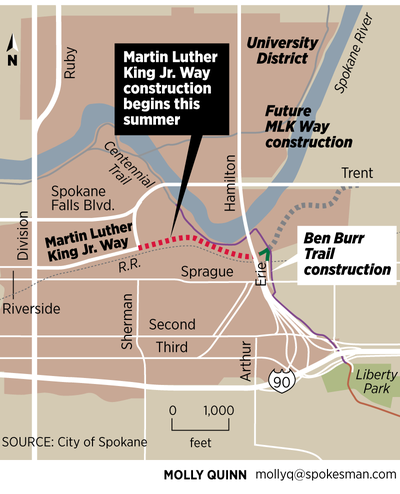City moves forward with delayed Martin Luther King Jr. boulevard extension, ponders condemnation

Martin Luther King Jr. Way through the University District will be finished, city officials say, even if land must be taken to do so.
The Spokane City Council is set to vote on a pair of proposals in the coming weeks aimed at completing the thoroughfare that would link Division Street and downtown with Trent Avenue in the East Central Neighborhood. But the work will be split into two phases because of an ongoing property dispute with Brown Building Materials, which has been doing business in a yard next to the railroad tracks for half a century.
“Clearly, we want to move ahead with the project,” said Marlene Feist, a spokeswoman with the city. “It’s a large area. It makes sense to do it in two construction seasons.”
Public works staff on Monday will recommend the council approve a $3.3 million contract with Halme Construction to extend the boulevard from its current termination at Sherman Street, west of the Hamilton Street bridge, to Erie Street. That work would be completed by next spring, city staff estimate, with the second portion of the project running along Front Avenue and north to a roundabout on Trent wrapping up next summer.
The contract amount will be paid mostly by federal grant money, but also state and local funds, Feist said.
The extension will look similar to the existing boulevard, with one lane in each direction, a raised median and 5-foot bike lanes on either side, according to planning documents. The City Council recently approved $1.1 million for upgrades to the Ben Burr Trail, which will cross the boulevard at Erie and link up with an existing trail system to the southeast. The trail will be built during the second phase of the extension in early 2017.
The first part of the boulevard, named for King by act of the City Council in 2011, was completed nearly four years ago. The city has been accumulating land on the east side of the project, much of it owned by BNSF. The railroad has been slow to process the city’s land buys, city staff say.
The city must move forward with construction this fall in order to make use of federal grant money that was earmarked for the project years ago, Feist said.
“We’re becoming concerned that we have some deadlines to be able to hold on to the federal money,” she said.
As the concrete is poured on the west side of the project, however, the city may find itself in a legal fight to move forward with the connection to Trent. Later this month, council members will be asked to authorize legal staff to start eminent domain proceedings to condemn a parcel of land owned by Ron Brown, owner of Brown Building Materials, needed for road construction. That action would be taken if current negotiations between the city and Brown prove unsuccessful, Feist said.
Bob Dunn, the attorney representing Brown, said the proposed action by the City Council is unsurprising.
“They’ve been negotiating for this parcel for four or five years. This has been a long-term deal,” Dunn said. “This didn’t happen overnight.”
Dunn said his client wants to expand the hardware supply business on land the city needs for road construction. The parties are disputing how much money Brown should receive for that land, and future entrances to the business.
University District leaders, Washington State University Spokane and Union Gospel Mission have come out in support of the road project, saying it will ease traffic congestion in the Riverpoint area and improve access to the mission’s shelter on Trent.
“We’re super excited,” said Phil Altmeyer, executive director of the Union Gospel Mission in Spokane. “Both streets on both sides of the mission will be vacated. We’ll end up with a nice campus.”
Karl Otterstrom, chairman of the University District Development Association board and leader of strategic planning for Spokane Transit Authority, said the extension of Martin Luther King Jr. Way is part of the district’s master plan and will increase access to schools and businesses in the community.
“Having those connections, whether it’s used by a car, a bike, or a pedestrian, all those things help stimulate activity,” he said.
In conjunction with planned improvements by the Department of Transportation on the Trent Avenue bridge closest to the Union Gospel, Altmeyer said, visitors will have better access to the shelter and cars will no longer kick up dust on the gravel portions of Erie. The mission will host an open house later this month to discuss the bridge improvements.
Also at stake in the boulevard extension is a proposed business complex on the south bank of the Spokane River. Developer Eric Brown, brother of Ron, has filed plans with the city to build four office buildings on the former site of the Spokane Natural Gas Co. The Department of Ecology has been spearheading cleanup efforts on the property, whose groundwater has tested positive for cyanide and arsenic, since the 1980s.
Eric Brown said Friday finishing Martin Luther King Jr. Way to Trent Avenue would be essential to attracting tenants to the proposed $5 million complex.
The city has been under pressure to complete the extension, Feist said, and has been fielding questions about its status.
“We just absolutely need to finish this project,” she said.